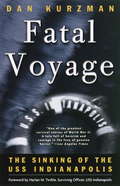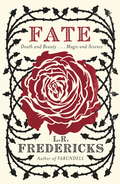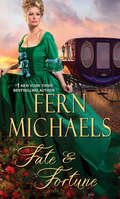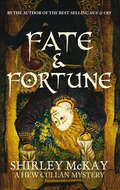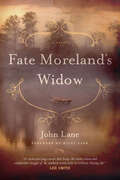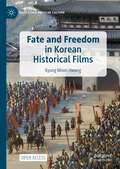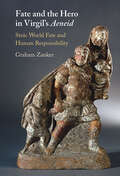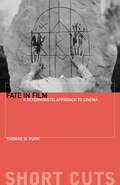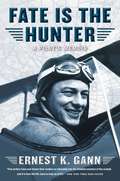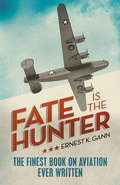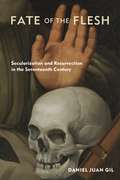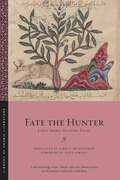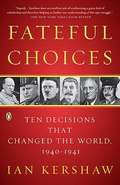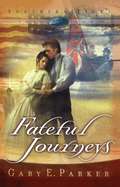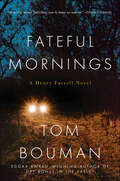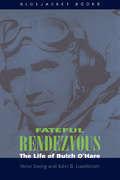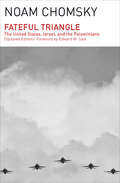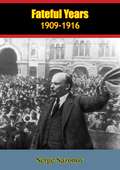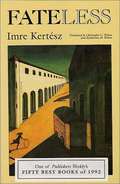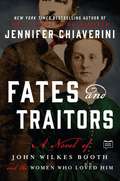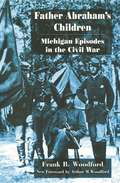- Table View
- List View
Fatal Voyage: The Sinking of the USS Indianapolis
by Dan KurzmanShortly after midnight on July 30, 1945, the Navy cruiser USS Indianapolis was torpedoed by a Japanese submarine in the Philippine Sea. The ship had just left the island of Tinian, delivering components of the atomic bomb destined for Hiroshima. As the torpedoes hit, the Indianapolis erupted into a fiery coffin, sinking in less than fifteen minutes and leaving nine hundred crewmen fighting for life in shark-infested waters. They expected a swift, routine rescue, unaware that the Navy high command didn't even realize that the Indianapolis was missing. Help would not arrive for another five days. Drawn from definitive interviews with key figures, Fatal Voyage recounts the horrific events endured as the number of water-treading survivors dwindled to just 316. Each gruesome day brought more madness and slow death, from explosion-related injuries, dehydration, and, most terrifying of all, shark attacks. But the pain did not end when the men finally returned home: The Indianapolis's commander, Captain Charles B. McVay III, was court-martialed for causing the clearly unavoidable disaster. With a new afterword chronicling the fifty-five-year campaign by Indianapolis survivors and their supporters to win public vindication for Captain McVay, this classic is restored, along with memories of the Indianapolis crew.
Fatalism and Development: Nepal's Struggle for Modernization
by Dor Bahadur BistaDor Bahadur Bista, being a Nepali, recounts all the events of the country's struggle to modernize from being a monarchy.
Fate
by L FredericksFATE is the story of Lord Francis Damory's quest for the elixir of immortality. Set against the magnificent background of the eighteenth century where science and magic, death and beauty meet in the gilded salons of the decadent nobility and the brothels and debtors' prisons of London, Francis tells of his many love affairs and his deadly duels, his encounters with courtesans and castrati, alchemists and anatomists, Rosicrucians, visionaries, monsters, charlatans, spies and assassins. His travels take him through France, across the Alpine passes to Venice and the pirate-infested Mediterranean Sea to Egypt, Cyprus and distant, exotic Constantinople on the trail of his mysterious ancestor Tobias - who might, just possibly, still be alive...
Fate
by L R FredericksFATE is the story of Lord Francis Damory's quest for the elixir of immortality. Set against the magnificent background of the eighteenth century where science and magic, death and beauty meet in the gilded salons of the decadent nobility and the brothels and debtors' prisons of London, Francis tells of his many love affairs and his deadly duels, his encounters with courtesans and castrati, alchemists and anatomists, Rosicrucians, visionaries, monsters, charlatans, spies and assassins. His travels take him through France, across the Alpine passes to Venice and the pirate-infested Mediterranean Sea to Egypt, Cyprus and distant, exotic Constantinople on the trail of his mysterious ancestor Tobias - who might, just possibly, still be alive...
Fate & Fortune
by Fern Michaels<p>Dear Reader, I’ve been lucky enough to share my stories with you for over forty years, and those first books occupy a special place in my heart. Vixen in Velvet and Whitefire are two of my earliest stories, and I am so happy to have this chance to introduce them to new readers. <p>VIXEN IN VELVET Beautiful, well-bred Victoria Rawlings sees only one way to avoid an arranged marriage—switching places with a tavern maid. Her daring scheme leads her to Marcus Chancelor, who, like Tori, is not what he seems. <p>The handsome American secretly poses as a highwayman to support a besieged colony. Once their identities are unmasked, will Tori seize a chance at happiness, far beyond the safety she’s known? WHITEFIRE Katerina Vaschenko seeks vengeance against the marauders who destroyed her village and stole her priceless horses for the mad czar. But she never dreamed that her sworn enemy the Mongol prince would be the one to aid her quest. Or that together, they would forge a destiny as magnificent as the land that is their glorious heritage. . . .
Fate & Fortune: A Hew Cullan Mystery (The Hew Cullan Mysteries #2)
by Shirley McKayIn the sixteenth century, a girl is found dead on the beach at St Andrews, Scotland, and a young scholar of the law must play sleuth. 1581: Young St Andrews academic Hew Cullan is unhappy with his life and disillusioned with the law. After his father&’s death he is invited by the advocate Richard Cunningham to complete his legal education in Edinburgh as Richard&’s pupil at the bar. Among his father&’s things, Hew finds a manuscript entitled &“In Defence of the Law,&” directed to the Edinburgh printer Christian Hall. At first, he resists its influence, but when a young girl is found dead on the beach at St Andrews, he is left unsettled and confused. He resolves to take the book to press and agrees to Richard&’s offer. Embarking on his new life in the capital, he falls in love. His relationships are fraught with lies and secrets and lead to brutal murder on the borough muir. Hew suspects a link with the dead girl on the beach. As he begins his desperate search to find the killer, he finds that the truth lies closer to home, in this historical mystery by a Dagger Award finalist.
Fate Moreland's Widow: A Novel (Story River Bks.)
by John LaneCorruption, infatuation, and conflicting loyalties collide in a rural Southern mill town in this debut novel by an award-winning poet and environmentalist.On a placid Blue Ridge mountain lake on Labor Day Weekend in 1935, three locals in an overloaded boat drown, and the cotton mill scion who owns the lake is indicted for their murders. Decades later Ben Crocker—a reluctant participant in the aftermath of this long-forgotten tragedy—is drawn back into the morally ambiguous world of mill fortunes and foothills justice.The son of mill workers in Carlton, South Carolina, Crocker works as bookkeeper to the owner, George McCane. And when McCane decides to lay off families connected to the Uprising of ‘34, Crocker finds himself in the ill-fitting position of enforcer. But days after the evictions, a surprise indictment lands McCane in jail and sinks Crocker even deeper into the escalating tensions.While traversing mountain communities in McCane’s defense, Crocker must also negotiate with labor organizers and fend off his family’s skepticism of his social aspirations. Meanwhile, hanging over Crocker’s upended life is his infatuation with Novie Moreland—the young widow of a man McCane is accused of killing. Looking back on this crucial period of his life, Crocker knows he must seek out Novie Moreland once more if he is ever to find closure with the past.Foreword by New York Times best-selling author Wiley Cash
Fate and Freedom in Korean Historical Films (East Asian Popular Culture)
by Kyung Moon HwangThis open access book examines the depiction of Korean history in recent South Korean historical films. Released over the Hallyu (“Korean Wave”) period starting in the mid-1990s, these films have reflected, shaped, and extended the thriving public discourse over national history. In these works, the balance between fate and freedom—the negotiation between societal constraints and individual will, as well as cyclical and linear history—functions as a central theme, subtext, or plot device for illuminating a rich variety of historical events, figures, and issues. In sum, these highly accomplished films set in Korea’s past address universal concerns about the relationship between structure and agency, whether in collective identity or in individual lives. Written in an engaging and accessible style by an established historian, Fate and Freedom in Korean Historical Films offers a distinctive perspective on understanding and appreciating Korean history and culture.
Fate and the Hero in Virgil's Aeneid: Stoic World Fate and Human Responsibility
by Graham ZankerThis book explores how Virgil in his Aeneid incorporates the ancient Stoics' thinking about how humans can exercise moral responsibility and how this can affect providential world fate. The third-century BC philosopher Chrysippus of Soli located this freedom in the way we can assent to courses of action, and Graham Zanker innovatively demonstrates how Virgil appropriates this concept in the way that Jupiter and Aeneas can assent to the world fate in which they have discovered they must play a part, or Juno and Dido can withhold their assent to it. Indeed, Virgil even offers the model to no-one less than Augustus: the emperor is invited to give his assent to ruling what was believed to be his 'world-wide' empire justly. The book is accessible to both students and professional scholars of the Aeneid, with all Greek and Latin translated into idiomatic English.
Fate in Film: A Deterministic Approach to Cinema (Short Cuts)
by Thomas M. PuhrThe course of events is predetermined and cannot be changed. Forces beyond our control—or even our comprehension—shape our fates. Such is the deterministic worldview embedded in a wide swath of contemporary cinema, from arthouse experiments to popular genre films, through both thematic concerns and narrative structures. These films, especially the recent spate of “elevated” science fiction and horror, tap into this deep-seated anxiety by focusing on characters who ultimately fail to transcend the patterns and structures that define them.Thomas M. Puhr identifies and analyzes the ways that cinema has dealt with the tension between fate and free will, from Stanley Kubrick’s The Shining to Christopher Nolan’s Tenet. He examines films that express deterministic ideas, including circular narratives of stasis or confinement and fatalistic portraits of external forces dictating characters’ lives. Puhr considers determinism at the levels of the individual, the family, and society, reading films in which characters are trapped by past or alternate selves, the burdens of family histories, or oppressive social structures. He explores how films such as Joel and Ethan Coen’s Inside Llewyn Davis, Ari Aster’s Hereditary, Jordan Peele’s Us, and Lucrecia Martel’s Zama confront the limits of human agency. Puhr relates deterministic themes to the nature of moviegoing: In denying characters any ability to choose alternative paths, these films mirror how viewers themselves can only sit and watch.Recasting the works of some of today’s most compelling directors, Fate in Film is an innovative critical account of an unrecognized yet crucial aspect of contemporary cinema.
Fate is the Hunter
by Ernest K. Gann"This fascinating, well-told autobiography is a complete refutation of the comfortable cliche that 'man is master of his fate.' As far as pilots are concerned, fate (or death) is a hunter who is constantly in pursuit of them...there is nothing depressing about FATE IS THE HUNTER. There is tension and suspense in it but there is great humor too. Happily, Gann never gets too technical for the layman to understand." (Saturday Review)
Fate is the Hunter: A Pilot's Memoir
by Ernest K. GannThe copper-bottomed classic from a memorable and courageous pilot.FATE IS THE HUNTER is a fascinating and thrilling account of some of the more memorable experiences Ernest K Gann had in the air. He's flown in both peace and war and come close to death many times. Here he reveals the characters he's known and the dramas he's experienced, portraying fate (or death) as a hunter constantly in pursuit of pilots. This is a fabulous account of both the history of aviation and one man's life in the air.
Fate of the Flesh: Secularization and Resurrection in the Seventeenth Century
by Daniel Juan GilIn the seventeenth century the ancient hope for the physical resurrection of the body and its flesh began an unexpected second life as critical theory, challenging the notion of an autonomous self and driving early modern avant-garde poetry. As an emerging empirical scientific world view and a rising Cartesian dualist ontology transformed the ancient hope for the resurrection of the flesh into the fantasy of a soul or mind living on separately from any body, literature complicated the terms of the debate. Such poets as Donne, Herbert, Vaughan, and Jonson picked up the discarded idea of the resurrection of the flesh and bent it from an apocalyptic future into the here and now to imagine the self already infused with the strange, vibrant materiality of the resurrection body.Fate of the Flesh explores what happens when seventeenth-century poets posit a resurrection body within the historical person. These poets see the resurrection body as the precondition for the social person’s identities and forms of agency and yet as deeply other to all such identities and agencies, an alien within the self that both enables and undercuts life as a social person. This perspective leads seventeenth-century poets to a compelling awareness of the unsettling materiality within the heart of the self and allows them to re-imagine agency, selfhood, and the natural world in its light. By developing a poetics that seeks a deranging materiality within the self, these poets anticipate twentieth-century “avant-garde” poetics. They frame their poems neither as simple representation nor as beautiful objects but as a form of social praxis that creates new communities of readers and writers assembled around a new experience of self-as-body mediated by poetry.
Fate the Hunter: Early Arabic Hunting Poems (Library of Arabic Literature)
by James E. MontgomeryA rich anthology of pre-Islamic and early Islamic poetry on the beauties and perils of the huntIn the poems of Fate the Hunter, many of them translated into English for the first time, trained cheetahs chase oryx, and goshawks glare from falconers’ arms, while archers stalk their prey across the desert plains and mountain ravines of the Arabian peninsula. With this collection, James E. Montgomery, acclaimed translator of War Songs by ʿAntarah ibn Shaddād, offers a new edition and translation of twenty-six early works of hunting poetry, or ṭardiyyāt. Included here are poems by pre-Islamic poets such as Imruʾ al-Qays and al-Shanfarā, as well as poets from the Umayyad era such as al-Shamardal ibn Sharīk. The volume concludes with the earliest extant epistle about hunting, written by ʿAbd al-Ḥamīd al-Kātib, a master of Arabic prose.Through the eyes of the poet, the hunter’s pursuit of the quarry mirrors Fate’s pursuit of both humans and nonhumans and highlights the ambiguity of the encounter. With breathtaking descriptions of falcons, gazelles, and saluki gazehounds, the poems in Fate the Hunter capture the drama and tension of the hunt while offering meditations on Fate, mortality, and death.An English-only edition.
Fateful Choices
by Ian KershawIan Kershaw's Fateful Choices: Ten Decisions that Changed the World, 1940-41 offers a penetrating insight into a series of momentous political decisions that shaped the course of the Second World War. The hurricane of events that marked the opening of the Second World War meant that anything could happen. For the aggressors there was no limit to their ambitions; for their victims a new Dark Age beckoned. Over the next few months their fates would be determined. In Fateful Choices Ian Kershaw re-creates the ten critical decisions taken between May 1940, when Britain chose not to surrender, and December 1941, when Hitler decided to destroy Europe's Jews, showing how these choices would recast the entire course of history. 'Powerfully argued . . . important . . . this book actually alters our perspective of the Second World War' Andrew Roberts 'This fascinating, closely-argued book adds to our understanding of a terrible war' Alan Massie 'A compelling re-examination of the conflict . . . Kershaw displays here those same qualities of scholarly rigour, careful argument and sound judgement that he brought to bear so successfully in his life of Hitler' Richard Overy 'A splendidly lucid and impeccably argued exposition of the greatest political decisions of the Second World War' Max Hastings 'How fortunate that it is Ian Kershaw bringing his immense knowledge and clarity of thought to the task . . . brilliantly explained . . . an immensely wise book' Anthony Beevor Ian Kershaw (b. 1943) was Professor of Modern History at the University of Sheffield from 1989-2008, and is one of the world's leading authorities on Hitler. His books include The 'Hitler Myth', his two volume biography Hitler 1889-1936: Hubris and Hitler 1936-1945: Nemesis, and Fateful Choices: Ten Decisions that Changed the World, 1940-1941. He was knighted in 2002.
Fateful Journeys
by Gary E. Parker"Who knows what will happen when those journeys end, and we come home again?"asks Camellia York while the dark clouds of the Civil War gather around her South Carolina home. In this second installment of the popular Southern Tides Trilogy, Camellia confronts the secrets of her startling past while half-brothers Josh Cain and Hampton York grapple with their deepest convictions during these desperate days of national upheaval. A heart-rendering epic of triumph on the costly road to freedom, Fateful Journeys sweeps readers away to experience the painful consequences of choices, the depth of unwavering love, and the indomitable spirit to rise above oppression. Advancing the major characters and storylines established in Secret Tides, this novel is a self-seller for fans of the genre as well as an obvious selection for those intrigued by the Civil War.
Fateful Mornings: A Henry Farrell Novel (The Henry Farrell Series #2)
by Tom Bouman“A terrific writer. Definitely one to keep an eye on.”—Dennis LehaneIn Wild Thyme, Pennsylvania, summer has brought Officer Henry Farrell nothing but trouble. Heroin has arrived with a surge in crime. When local carpenter Kevin O’Keeffe admits that he shot a man and that his girlfriend, Penny, is missing, the search leads the small-town cop to an industrial vice district across state lines that has already ensnared more than one of his neighbors. With the patience of a hunter, Farrell ventures into a world of shadow beyond the fields and forests of home.Fateful Mornings is the second book in the Henry Farrell series. Tom Bouman's Officer Farrell returns in The Bramble and the Rose.
Fateful Rendezvous
by Steve Ewing John B. LundstromFighter pilot Butch O'Hare became one of America's heroes in 1942 when he saved the carrier Lexington in what has been called the most daring single action in the history of combat aviation. In fascinating detail the authors describe how O'Hare shot down five attacking Japanese bombers and severely damaged a sixth and other awe-inspiring feats of aerial combat that won him awards, including the Medal of Honor. They also explain his key role in developing tactics and night-fighting techniques that helped defeat the Japanese.In addition, the authors investigate events leading up to O'Hare's disappearance in 1943 while intercepting torpedo bombers headed for the Enterprise. First published in 1997, this biography utilizes O'Hare family papers and U.S. and Japanese war records as well as eyewitness interviews. It is essential reading for a true understanding of the development of the combat naval aviation and the talents of the universally admired and well-liked Butch O'Hare.
Fateful Ties
by Gordon H. ChangAmericans look to China with fascination and fear, unsure whether it is friend or foe but certain it will play a crucial role in their future. This is nothing new, Gordon Chang says. Fateful Ties draws on literature, art, biography, popular culture, and politics to trace America's long and varied preoccupation with China.
Fateful Triangle: The United States, Israel, and the Palestinians (Updated Edition) (South End Press Classics Ser. #Vol. 3)
by Noam Chomsky&“One of the definitive works on the Israeli Palestinian conflict&” from the celebrated New York Times–bestselling author of Hopes and Prospects (Amy Goodman, host of Democracy Now! and author of Breaking the Sound Barrier). From its establishment to the present day, Israel has enjoyed a unique position in the American roster of international friends. In Fateful Triangle, Noam Chomsky explores the character and historical development of this special relationship. The resulting work &“may be the most ambitious book ever attempted on the conflict between Zionism and the Palestinians viewed as centrally involving the United States. It is a dogged exposé of human corruption, greed, and intellectual dishonesty. It is also a great and important book, which must be read by anyone concerned with public affairs&” (Edward W. Said, from the foreword). &“A devastating collection of charges aimed at Israeli and American policies that affect the Palestinian Arabs negatively.&” ―Library Journal &“Brilliant and unscrupulous.&” ―The Observer &“A major, timely and devastating analysis of one of the great tragedies.&” ―The Tribune &“Formidable.&” ―The Jewish Quarterly
Fateful Years, 1909-1916: 1914)
by Serge SazonovTHE catastrophe which overwhelmed Europe in July, 1914, the effects of which made themselves felt more or less over the whole world, cannot yet be made the subject of scientific historical investigation. So immense a task is beyond the powers of those who witnessed and still more of those who were directly concerned in it. It must be left to the rising generation, in the hope that their remoteness from these events will ensure for their labours the necessary freedom from prejudice and that they will have access to historical material more complete than that already available, important as that is.Those who read these short recollections must not expect to I find in them a consecutive and full exposition of the course of the historic events of which I was a witness, or in which I participated, but only my personal estimate of them in the light of the information which I possessed. They will find these occurrences set out objectively in the official compilations of diplomatic documents published, both at the beginning of the European War and later by the Governments of the belligerent Powers, and also in the endless literature published in every language during recent years, and referring, not only to the actual war period, but also to the period that preceded it.
Fateless
by Imre Kertész Christopher C. Wilson Kathryn M. WilsonEnglish translation of a moving and disturbing novel about a Hungarian Jewish boy's experiences in German concentration camps and his attempts to reconcile himself to those experiences after the war. Returning to his native Budapest, still clad in prison clothes, George experiences a variety of emotions, ultimately coming to the conclusion that neither his Jewishness nor his Hungarianness will solve his fate.
Fates and Traitors: A Novel of John Wilkes Booth
by Jennifer Chiaverini"Fates and Traitors is a novel about mothers and sons, brothers and sisters, the line between patriot and traitor, and the lengths we go to for love. A fascinating look at a slice of our country's history, an incisive portrait of obsession, and overall impossible to put down." --Sara Gruen, New York Times bestselling author of At the Water's Edge and Water for ElephantsThe New York Times bestselling author of Mrs. Lincoln's Dressmaker returns with a riveting work of historical fiction following the notorious John Wilkes Booth and the four women who kept his perilous confidence. John Wilkes Booth, the mercurial son of an acclaimed British stage actor and a Covent Garden flower girl, committed one of the most notorious acts in American history--the assassination of President Abraham Lincoln. The subject of more than a century of scholarship, speculation, and even obsession, Booth is often portrayed as a shadowy figure, a violent loner whose single murderous act made him the most hated man in America. Lost to history until now is the story of the four women whom he loved and who loved him in return: Mary Ann, the steadfast matriarch of the Booth family; Asia, his loyal sister and confidante; Lucy Lambert Hale, the senator's daughter who adored Booth yet tragically misunderstood the intensity of his wrath; and Mary Surratt, the Confederate widow entrusted with the secrets of his vengeful plot. Fates and Traitors brings to life pivotal actors--some willing, others unwitting--who made an indelible mark on the history of our nation. Chiaverini portrays not just a soul in turmoil but a country at the precipice of immense change.From the Hardcover edition.
Fates of the Performative: From the Linguistic Turn to the New Materialism (Thinking Theory)
by Jeffrey T. NealonA powerful new examination of the performative that asks &“what&’s next?&” for this well-worn concept From its humble origins in J. L. Austin&’s speech-act theory of the 1950s, the performative has grown to permeate wildly diverse scholarly fields, ranging from deconstruction and feminism to legal theory and even theories about the structure of matter. Here Jeffrey T. Nealon discovers how the performative will remain vital in the twenty-first century, arguing that it was never merely concerned with linguistic meaning but rather constitutes an insight into the workings of immaterial force.Fates of the Performative takes a deep dive into this &“performative force&” to think about the continued power and relevance of this wide-ranging concept. Offering both a history of the performative&’s mutations and a diagnosis of its present state, Nealon traces how it has been deployed by key writers in the past sixty years, including foundational thinkers like Jacques Derrida, Eve Kosofsky Sedgewick, and Judith Butler; contemporary theorists such as Thomas Piketty and Antonio Negri; and the &“conceptual poetry&” of Kenneth Goldsmith.Ultimately, Nealon&’s inquiry is animated by one powerful question: what&’s living and what&’s dead in performative theory? In deconstructing the reaction against the performative in current humanist thought, Fates of the Performative opens up important conversations about systems theory, animal studies, object-oriented ontology, and the digital humanities. Nealon&’s stirring appeal makes a necessary declaration of the performative&’s continued power and relevance at a time of neoliberal ascendancy.
Father Abraham's Children: Michigan Episodes in the Civil War (Great Lakes Books Ser.)
by Frank B. Woodford Arthur M. WoodfordThe Civil War was the largest and bloodiest conflict ever waged upon American soil, and while no fighting took place in Michigan, both the hardship of the war effort and the heroism of Michigan men at war touched residents deeply. In Father Abraham's Children: Michigan Episodes in the Civil War, Frank Woodford collects personal remembrances of the war from many sources. Originally published in 1961 and reissued in 1999, this volume is not a formal account of Michigan's part in the conflict or an analysis of military strategy and wartime politics, but instead presents stories of Michigan soldiers, both as individuals and as units, and their actions, thoughts, and aspirations, presented for the first time in a paperback edition. Among the episodes Woodford recounts with a wealth of colorful detail are Michigan's participation in the Underground Railroad; the strange tale of Sarah Emma Edmonds, alias Private Franklin Thompson; the ill-fated strategy that led to the slaughter at the Crater; an odyssey of escape from Danville and from Libby Prison; the bizarre Confederate plot to capture a Federal sloop-of-war on Lake Erie; the Michigan Cavalry Brigade's exploits under George Custer; the chance encounter with a Michigan soldier that brought death to the gallant Jeb Stuart; impressions and descriptions of camp life and the ordinary routine of a soldier from the diary of Private Frank Lane; the disaster of the First Michigan at Bull Run; the story of Michigan's medical services and the origin of Harper Hospital; the Detroit Riot of 1863; and the nightmare explosion of the steamer Sultana with a death toll of over 1,200 soldiers on their way home from Confederate prisons. Civil War buffs and readers interested in Michigan history will be grateful for the paperback edition of Father Abraham's Children.
